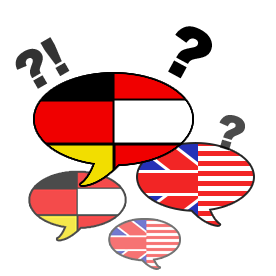Studying Hungarian Effectively
Understanding Hungarian language
Above all, learners should accept the uniqueness of Hungarian; it forms a language island in Central Europe. There is no consensus among scientists about the exact composition of the language spoken by about 14.5 million Magyars, at least it belongs to the Finno-Ugric branch of the Uralic language family and came into contact with Turkic-speaking ethnic groups and the Crimean Goths. It has been influenced by Slavic languages in the last 1000 years and by German in the past 300.
The special structure of the language makes it difficult for Indo-European speakers, but it is easy to lead them to it, and in some respects Hungarian is simpler and easier than German or English.
In Hungarian...
- there is no grammatical gender
- there are no prepositions
- there is only one past and one future form
- the passive form is very rare
- the pronunciation largely corresponds to the written form (the "swallowing" of sounds is atypical)
The emphasis is almost always on the first syllable of the word - it sounds as if Hungarians are constantly hitting the table, so to speak - except in question sentences, where the pitch is also clearly raised.
The Hungarian language is extraordinarily rhythmic and melodious.
The beginning is easier for learners with good hearing who perhaps also play an instrument. The ability to imitate (flexibility) helps in the acquisition of any language. That's why I use poems in lessons and especially songs with children. The Hungarian language may seem complicated, but it is very logical.
Southern Europeans find it easier to imitate, while many Northerners find the intonation funny (for example in sentences like "Nem jönnétek el ma színházba?"). The latter also praise the extraordinarily beautiful sound of the language.
With German, Hungarian shows coincidental similarities such as the ending of possessive pronouns: enyém - mein, tiéd - dein.
The word order is very flexible, the sentence elements ranked according to importance.
In long words, the approach accelerates the tempo. The Hungarian language is very rhythmic (e.g. kitakarítottátok).
In Hungarian, there is no grammatical genus (nobody misses it); there is no need to cram the genera of nouns, as in most European languages.
Another simplification in learning is the equality of the conjunction of nouns and verbs for example:
- házUNK és tanulUNK (our house and we learn)
- kulcsOM és mondOM (my key and I say)
There are a vast numbers of synonyms (think, for example, of the 20 or so synonyms of the words man or woman).
My students are always happy when they learn that we (sometimes) only use a past tense. The togetherness of the definite and indefinite conjugation is present in every tenses.
The vocabulary of the multinational Carpathian Basin is colourfully mixed, yet the language of the Magyars is absolutely resistant to external influences. For example, it is not susceptible to the blatant influence of English worldwide. Poor translations or reproductions of advertisements, such as "Rendelje meg online! (Order it online!) have no chance at all, because suffixes in Hungarian belong at the end of the word. "Rendelje meg az interneten!"
Words are always welcome, but foreign structures cannot take root in ours.
Why learning Hungarian?

Hungarian is an excellent language for expressing feelings. If the
Hungarian gets homesick, it is mainly because of his need for emotional communication. It is not by chance that Hungarian is especially in poetry excellent.
Hungarian is a language rich in vocabulary and instruments, it is creative, you can always conjure new things out of it. It may be complicated, but whether it is mastered by reason or imitation, everyone loves it.
Suggestions
It is important to listen to native language speakers, especially for basic conversations. Listening materials should be bilingual, and text books should not only contain the script of the conversation but the related grammar and vocabulary as well in the working language.
I aim to use topics that the students can easily relate to, and are very handy in everyday communications:
- Business trips
- Looking for an apartment
- Residence permit
- Working permit
- Labor contract
- Insurance
- How to fill out forms
- Requests to helping organizations
- Matters of relatives and school
- Hungarian legal knowledge
übersetzung dolmetscher kurs class

